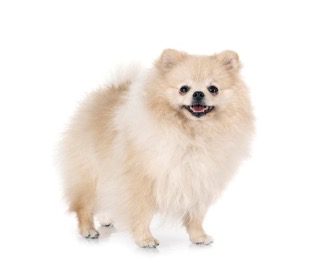
The Pomeranian is a very popular and lively small breed of dog. Their origins date back to the late 1600s in northern Europe, where they were originally used as sled and guard dogs. They have since become beloved companion animals. They are known for their small size, usually weighing between 3 and 7 lbs, and standing 6-7 inches tall. Their most distinctive feature is their gorgeous coats, which are double-coated and made up of long, fluffy and abundant hair. There are many color variations, with black, tan, orange, cream, sable, and white being the most common. This breed was created by blending small Spitz-type breeds such as German Spitz, Keeshond and Italian Miniature Spitz, Eskimos, Siberian Samoyeds, and Pomeranians from the island of Pomerania in the Baltic Sea. The Pomeranian is an intelligent and sweet-natured breed. They have alert personalities and love attention. Their small size, charming personality, and intelligence make them great family pets. They are also very dedicated and make great companion animals. With their beautiful coats and inquisitive personalities, they are a very special and beloved breed.
The Pomeranian is a friendly and gentle dog that loves to please its owners. They are quite intelligent and playful, making them great companions for children and other pets. Pomeranians are known to be patient and tolerant, making them a good fit for many families. To get the most out of their temperament, it’s important to provide early training and socialization. This breed has moderate energy levels and needs regular exercise, but can also live indoors and do well with daily walks and playtime. Pomeranians are usually quiet and can form strong bonds with their owners, making them an ideal household pet.
The Pomeranian is a playful and active breed that requires nutritious meals to keep their energy levels high. A healthy diet should include quality proteins and carbohydrates for sustained energy, as well as adequate fat and essential vitamins and minerals for optimum health. Feeding guidelines should include 2-3 small meals per day, rather than one larger meal. Responsible ownership involves feeding your dog according to their size and activity level in order to maintain a healthy weight.
It is also important to be aware of what types of food are suitable for your Pomeranian’s nutritional needs, as many processed foods contain unnecessary fillers and poor quality ingredients. Way Canina is a great resource to learn more about your Pomeranian’s dietary needs, as they provide detailed information regarding which types of food are okay for your furry friend and how to provide a balanced diet.
In summary, the Pomeranian is a friendly, energetic breed that requires a nutritious diet and regular exercise in order to remain healthy. Through proper feeding and responsible ownership, your Pomeranian can lead an active and healthy lifestyle. For more information about the nutritional requirements and feeding guidelines for this breed, be sure to visit Way Canina for helpful advice.
Pomeranians are a small dog breed known for their thick, luxurious double coats. They are a healthy breed with most issues being related to genetic predispositions. It is important to take your Pomeranian for regular veterinary check-ups, vaccinations, and preventive healthcare. Grooming needs include brushing and combing of the double coat, bathing, and cleaning of the ears. The average lifespan of a Pomeranian is between 12-16 years, although some may live longer or shorter. Age and genetics are two major factors that influence longevity, however a nutritionally balanced diet, regular exercise, and proper healthcare can all help your pup stay healthy and happy.
Are you thinking about getting a Pomeranian? Before you decide, be sure to consider the responsibilities involved in owning this particular breed. Look at its pros and cons and research its specific lifestyle needs. Make sure it’s the right fit for you and your family. Check out our blog posts and articles on Way Canina for more information on different dog breeds, their lifestyle needs, and advice for responsible dog ownership.